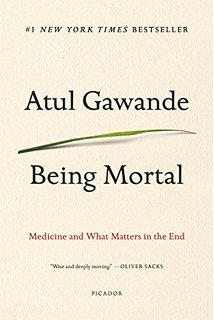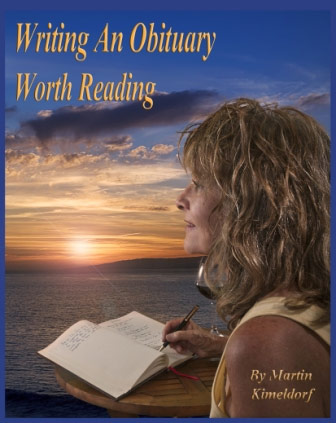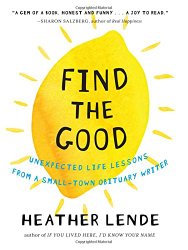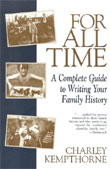Advocating for Those at the End of Life
February 8, 2017
David McConkey
There has been change in the way we look at the end of life. Increasingly, we recognize the advantages of openly acknowledging and preparing for death.Sometimes this new awareness is not so quiet. One example is the often contentious political debate over legislation around the issue of doctor- assisted death. Another is the growing recognition that our medical system is too much oriented to intervention and not enough on allowing a peaceful death when it is time.
The book Being Mortal: Medicine and What Matters in the End by Atul Gawande is an articulate cri de coeur for change. Gawande, a physician, points out how modern medicine often does not allow for what patients want most at the end of their lives. Gawande says that too often, “the waning days of our lives are given over to treatments that addle our brains and sap our bodies for a sliver’s chance of benefit.”
“Surveys find,” Gawande writes, that the top concerns of the dying “include avoiding suffering, strengthening relationships with family and friends, being mentally aware, not being a burden on others, and achieving a sense that their life is complete.”
Conventional medical practices do not allow space for what Gawande calls the “dying role.” As one’s life is reaching its finale, he says, “People want to share memories, pass on wisdoms and keepsakes, settle relationships, establish their legacies, make peace with God, and ensure that those who are left behind will be OK.”
Doctors should do all they can to help their patients be able to fulfill this task. The “dying role,” he writes, is “among life’s most important, for both the dying and those left behin
 d.”
d.” Gawande outlines an approach for developing “a new ideal for how we die.” Among the ways: becoming more comfortable with discussing end-of-life issues and then helping patients be more comfortable as they approach the end of their lives.
Patients would then have the best chance to live their last days with less pain, with more peace, and with the most space to fulfill their “dying role.”
Another advocate for the dying and for changing our institutions is B.J. Miller. Miller is a hospice and palliative care physician, who has been the director of the Zen Hospice Project in San Francisco for the last five years. He has taken his message of a dignified and graceful end of life for his patients to a wider audience. His TED Talk What Really Matters at the End of Life was one of the most popular talks of 2015, and has been viewed more than 5 million times. Miller has also been interviewed on the Tim Ferriss podcast. And he was recently the subject of a profile in the New York Times Magazine.
Miller brings a poignant personal story to his work – and one that enables him to identify more with his patients. An accident resulting from some college hi jinks left him with the amputation of three limbs. “Parts of me died early on,” he says in his TED Talk, “and that's something we can all say one way or another.”
In his TED Talk, he outlines his concerns with traditional medicine. “Healthcare was designed with diseases, not people, at its center. Which is to say, of course, it was badly designed. And nowhere are the effects of bad design more heartbreaking or the opportunity for good design more compelling than at the end of life.”
He echoes the concerns of Gawande: that more than anything else, patients at the end of life need comfort and peace. “For most people,” he says, “the scariest thing about death isn't being dead, it's dying, suffering.”
His request is that “we make space – physical, psychic room, to allow life to play itself all the way out – so that rather than just getting out of the way, aging and dying can become a process of crescendo through to the end.”
The Zen Hospice Project is a small non-profit organization that grew out of the San Francisco Zen Center. The Project is inspired by – but not limited to – its origin in Buddhist teachings. The Project currently trains volunteers for wider work and also operates a six-bed residential hospice.
The New York Times Magazine described the Buddhist influence: “There’s an emphasis on accepting suffering, on not getting tripped up by one’s own discomfort around it.” As Miller explained, “You train people not to run away from hard things, not to run away from the suffering of others.”
The Zen Hospice residence is described by the magazine as “a calm, unpretentious space: a large Victorian home with six beds in five bedrooms, vaulted ceilings, slightly shabby furniture and warm, Oriental rugs. There is a large wooden Buddha in the dining room. The kitchen is light-filled and bursting with flowers. There’s always a pot of tea and often freshly baked cookies.”
The aim of the hospice is to allow patients the freedom to die on their own terms. And part of that might be to resist the temptation to expect an experience of wonderful awe in that space between life and death.
“Most people aren’t having these transformative deathbed moments,” Miller told the magazine. “And if you hold that out as a goal, they’re just going to feel like they’re failing.”
At the same time, Miller points out that living a good life can be good preparation for a good death. And that an awareness of death can help inspire a better life.
“The lessons I get from my patients and their families, and from this work,” Miller said, “is to enjoy this big, huge, mystical, crazy, beautiful, wacky world.”
* *
*
See Also:
“A New Ideal For How We Die”
What Really Matters at the End of Life, TED Talk
One Man’s Quest to Change the Way We Die, New York Times Magazine
The Man Who Studied 1,000 Deaths to Learn How to Live, Tim Ferriss Podcast
So Many Reasons to Appreciate Podcasts
Being Mortal on Amazon.com (on
Amazon.ca
(on
Amazon.ca )
)
Death Doulas and Death Cafés
“A New Ideal For How We Die”
What Really Matters at the End of Life, TED Talk
One Man’s Quest to Change the Way We Die, New York Times Magazine
The Man Who Studied 1,000 Deaths to Learn How to Live, Tim Ferriss Podcast
So Many Reasons to Appreciate Podcasts
Being Mortal on Amazon.com
Death Doulas and Death Cafés
More From Obituary Guide:
- Writing Your Own Obituary Offers Chance for Reflection
- How to Write a Legacy Letter (Ethical Will)
- A Family History Writing Workshop
- Helping Families "Most Satisfying Work" for Funeral Celebrant
- Be Prepared: Will, Health Care Directive (Living Will), and More
Books You May Find of Interest:
Not Quite What I Was Planning:
Six-Word Memoirs

Writing an Obituary Worth Reading:
A Guide to Writing a Fulfilling Life Review

Find the Good:
Unexpected Life lessons From a Small-Town
Obituary Writer

Having the Last Say:
Capturing Your Legacy in One Small Story

Obit:
Inspiring Stories of Ordinary People Who Led Extraordinary Lives
For All Time:
A Complete Guide to Writing Your Family History

Thrive:
The Third Metric to Redefining Success and Creating a Life of
Well-Being, Wisdom, and Wonder

Press Ctrl + D to Bookmark this page

